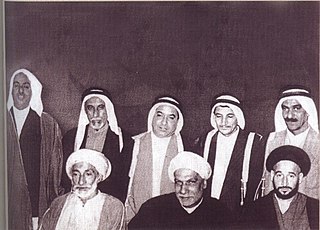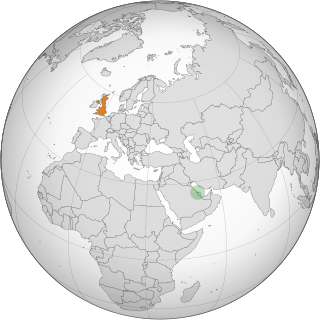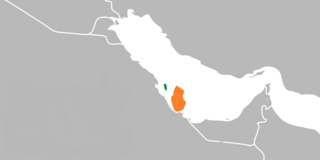Related Research Articles

Manama is the capital and largest city of Bahrain, with an approximate population of 200,000 people as of 2020. Long an important trading center in the Persian Gulf, Manama is home to a very diverse population. After periods of Portuguese and Persian control and invasions from the ruling dynasties of Saudi Arabia and Oman, Bahrain established itself as an independent nation in 1971 after a period of British hegemony.
Bahrain was a central location of the ancient Dilmun civilization. Bahrain's strategic location in the Persian Gulf has brought rule and influence from mostly the Persians, Sumerians, Assyrians, Babylonians, Portuguese, the Arabs, and the British.

Bahrani Arabic is a variety of Arabic spoken by the Baharna in Eastern Arabia and Oman. In Bahrain, the dialect is primarily spoken in Shia villages and some parts of Manama. In Saudi Arabia, the dialect is spoken in the governorate of Qatif.

Bahraini Jews constitute one of the world's smallest Jewish communities, although its origins go back to late antiquity. Talmudic sources refer to ports and islands on the Persian Gulf, indicating that Jews may have already settled in this region. Arabic sources record Jews in the old capital of Bahrain, Hajar, at the time of the Islamic conquest in 630 C.E. In the 12th century, the Jewish traveler-adventurer Benjamin of Tudela mentions 500 Jews living in Qays, and 5,000 in Al-Qatîf, involved in pearl fishery. In the 19th century, there were Jewish merchants from Iraq, Persia, and India in Bahrain.

The cinema of Bahrain is small as its lacks support from the government and the private sector. There are many short films produced by individual filmmakers, and about five feature films in Bahrain's history.

The National Union Committee was a nationalist reformist political organization formed in Bahrain in 1954. The committee was formed by reformists in response to sectarian clashes between Sunni and Shia members of the population. Its foundations were laid in the journal, Sawt al-Bahrain, which was founded and published by these reformist figures. The original aims were to push for an elected popular assembly, a codified system of civil and criminal law, the establishment of an appellate court, the right to form trade unions, an end to British colonial influence, and an end to sectarianism.

Bahrain, officially the Kingdom of Bahrain, is an island country in West Asia. It is situated on the Persian Gulf, and comprises a small archipelago made up of 50 natural islands and an additional 33 artificial islands, centered on Bahrain Island which makes up around 83 per cent of the country's landmass. Bahrain is situated between Qatar and the northeastern coast of Saudi Arabia, to which it is connected by the King Fahd Causeway. The current population of Bahrain is 1,870,817 as of May 14, 2023, based on elaborations of the latest United Nations data, of whom 712,362 are Bahraini nationals. Bahrain spans some 760 square kilometres (290 sq mi), and is the third-smallest nation in Asia after the Maldives and Singapore. The capital and largest city is Manama.

Bilateral relations exist between Kingdom of Bahrain and the United Kingdom of Great Britain and Northern Ireland. Bahrain has an embassy in London and the United Kingdom is one of only four European countries to maintain an embassy in Manama. Bahrain gained independence from the United Kingdom in 1971 and has since maintained strong diplomatic, military and trade relations.

The 2011Bahraini uprising was a series of anti-government protests in Bahrain led by the Shia-dominant and some Sunni minority Bahraini opposition from 2011 until 2014. The protests were inspired by the unrest of the 2011 Arab Spring and protests in Tunisia and Egypt and escalated to daily clashes after the Bahraini government repressed the revolt with the support of the Gulf Cooperation Council and Peninsula Shield Force. The Bahraini protests were a series of demonstrations, amounting to a sustained campaign of non-violent civil disobedience and some violent resistance in the Persian Gulf country of Bahrain. As part of the revolutionary wave of protests in the Middle East and North Africa following the self-immolation of Mohamed Bouazizi in Tunisia, the Bahraini protests were initially aimed at achieving greater political freedom and equality for the 70% Shia population.

In the wake of the 1947–48 Civil War in Mandatory Palestine, a riot against the Jewish community of Manama, in the British Protectorate of Bahrain, on December 5, 1947. A mob of Iranian and Trucial States sailors ran through the Manama Souq, looted Jewish homes and shops, and destroyed the synagogue. One Jewish woman died; she was either killed or died from fright.
The international reactions to the 2011 Bahraini uprising include responses by supranational organisations, non-governmental organisations, media organisations, and both the governments and civil populaces, like of fellow sovereign states to the protests and uprising in Bahrain during the Arab Spring. The small island nation's territorial position in the Persian Gulf not only makes it a key contending regional power but also determines its geostrategic position as a buffer between the Arab World and Iran. Hence, the geostrategic implications aid in explaining international responses to the uprising in Bahrain. Accordingly, as a proxy state between Saudi Arabia and Iran, Bahrain's domestic politics is both wittingly and unavoidably shaped by regional forces and variables that determine the country's response to internal and external pressures.
The administrative reforms of the 1920s were a series of British-led reforms that have laid the foundations of modern Bahrain. They took place between 1919 and 1927, but their background extends to the early 19th century. Britain signed a number of treaties with Bahrain in 1820, 1861, 1880 and 1892. The latter two had effectively turned Bahrain into a British Protectorate. Earlier in 1869, Britain had appointed the young Shaikh Isa ibn Ali Al Khalifa as ruler. Shaikh Isa was an autocrat and a feudal overlord whose authority was shared with his family and Sunni tribal allies. The economy was dependent on pearl diving and palm farming. Both sectors suffered from great inequalities; the conditions of the mostly Baharnah (Shia) peasants and the mostly non-Bahraini divers were often compared to slaves. Since the beginning of the 20th century, the British influence in Bahrain has been on the rise; in 1904-5 they extended their jurisdiction over all foreigners and in 1913 issued an Order in Council, which effectively turned Bahrain into a colony. The Order was not implemented until after the end of World War I.

Bilateral relations exist between the State of Qatar and the Kingdom of Bahrain. They first began in 1971.

The Saudi–led intervention in Bahrain began on 14 March 2011 to assist the Bahraini government in suppressing an anti-government uprising in the country. The intervention came three weeks after the U.S. pressured Bahrain to withdraw its military forces from the streets. As a decision by Gulf Cooperation Council (GCC), the intervention included sending 1,000 (1,200) troops with vehicles from Saudi Arabia at the invitation of the Al-Khalifa ruling family, marking the first time the GCC used such a collective military option for suppressing a revolt.
Mohamed Saad Marzooq Almla Marzooq Al-Romaihi is a Bahraini professional footballer who currently plays as a forward for Manama club and the Bahrain national team.

Bilateral relations exist between the countries of Bahrain and Iran. Since the 1979 Iranian Revolution, relations between the two countries have been strained over various geopolitical issues such as the interpretations of Islam, aspirations for leadership of the Islamic world, and relations with the United States, Europe, and other Western countries. In addition, Iran has been severely critical of Bahrain for hosting the United States Fifth Fleet within the Persian Gulf at the Naval Support Activity Bahrain base.
Abdullah bin Ahmad Al Khalifa (1769–1849) was the ruler of Bahrain between 1821 and 1843. He was the fifth monarch of the Al Khalifa dynasty.
Al Qafilah was a weekly newspaper published in Manama, Bahrain, between 1952 and 1956.
Ali Sayyar was a veteran Bahraini journalist who founded and edited a newspaper, Al Qafilah, and a magazine, Sada Al Osbou. He was one of the founding fathers of the Bahraini press.

Abdul Rahman Al Bakir was a leading activist and one of the independence leaders in the Arab Gulf states in the 20th century. He was the founding member and secretary of the National Union Committee (NUC), a non-sectarian and pan-Arab independence group established in Bahrain in 1954.
References
- ↑ Troy Michael Carter (2014). Traditions of protest, institutional sectarianism, and oil rentierism in authoritarian Bahrain (MA thesis). American University, Beirut. p. 58. hdl:10938/10241.
- 1 2 3 4 5 6 7 8 9 10 11 Wafa Alsayed (1 July 2020). "Sawt al-Bahrain: A Window onto the Gulf's Social and Political History". London School of Economics. Retrieved 22 April 2021.
- 1 2 3 4 5 Toby Matthiesen (2014). "Migration, Minorities, and Radical Networks: Labour Movements and Opposition Groups in Saudi Arabia, 1950–1975". International Review of Social History . 59 (3): 473–504. doi: 10.1017/S0020859014000455 .
- 1 2 3 Hamad Ebrahim Abdulla (2016). Sir Charles Belgrave and the Rise and Fall of Bahrain's National Union Committee (PhD thesis). University of East Anglia.
- ↑ Mohammed Ghanim Al Rumaihi (1973). Social and political change in Bahrain since the First World War (PhD thesis). Durham University. p. 359.
- 1 2 Nelida Fuccaro (2013). "Shaping the Urban Life of Oil in Bahrain". Comparative Studies of South Asia, Africa and the Middle East. 33 (1): 59–74. doi:10.1215/1089201X-2072721.
- ↑ "Veteran Bahraini journalist Ali Sayyar mourned". GDN Life. 9 October 2019. Retrieved 23 April 2021.
- 1 2 Toby Matthiesen (2014). The Other Saudis. Shiism, Dissent and Sectarianism. New York: Cambridge University Press. pp. 72–73. doi:10.1017/CBO9781107337732. ISBN 9781107337732.
- ↑ Kamyar Ebdi (2007). "The Name Game. The Persian Gulf, Archaeologists, and the Politics of Arab-Iranian Relations". In Philip L. Kohl; Mara Kozelsky; Nachman Ben-Yehuda (eds.). Selective Remembrances: Archaeology in the Construction, Commemoration, and Consecration of National Pasts. Chicago, IL; London: University of Chicago Press. p. 225. ISBN 978-0-226-45059-9.
- ↑ Kylie Moore Gilbert (2016). "From Protected State to Protection Racket: Contextualising Divide and Rule in Bahrain". Journal of Arabian Studies. 6 (2): 163–181. doi:10.1080/21534764.2016.1247521. S2CID 157736846.
- ↑ Alaaeldin Mahmoud (2017). "Does Persian/Arabian-Gulf Comparative Literature Exist? An Exploration of the Practices of Comparatists in the Gulf Council Countries". Revista Brasileira de Literatura Comparada. 19 (30): 107–118.
- ↑ Derek Jones, ed. (2001). "Bahrain". Censorship: A World Encyclopedia. Vol. 1–4. London; New York: Routledge. p. 169. ISBN 978-1-136-79864-1.
- ↑ Marc Owen Jones (2016). Methods of Repression in Bahrain during the 20th and 21st Century: From the Civil List to Social Media (PhD thesis). Durham University. p. 234.
- ↑ Thomas Fibiger (2020). "Silencing the voice of Bahrain? Regime-critical media and Bahrain's London diaspora". Journal of Arab & Muslim Media Research. 13 (1): 51–66. doi:10.1386/jammr_00010_1. S2CID 216384414.